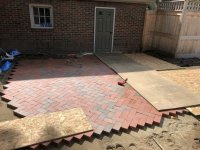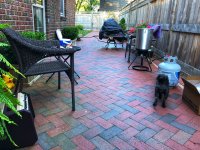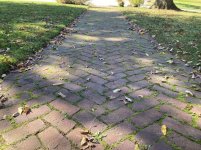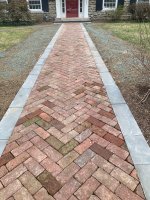- Jul 14, 2017
- 738
- Pool Size
- 24000
- Surface
- Plaster
- Chlorine
- Salt Water Generator
- SWG Type
- Hayward Aqua Rite (T-15)
We’ve got ancient brick patios and walks around the house (not next to the pool). They’re probably original to the house and over 100 years old. They are below grade of the landscaping, uneven, and weed filled. Time to re-lay them.
The bricks themselves seem to be mostly in good shape and we’ll reuse the material. We’re talking to a landscape company with a very good reputation and everything seems right with the quote (6” stone base, etc). They’re charging the appropriate fortune for the labor.
My only hangup is on using poly-sand. Assuming it is installed right, how long does it hold up and whats involved when it needs to be removed and replaced? A neighbor of mine who is in the business doesn’t trust it. Hes seen too many cases where it only solidifies on the very top layer and cracks and fails quickly. Then it is a giant PIA to remove and redo because what did solidify is stuck to the pavers.
Assuming we’re not hiring idiots to do the job, is this a 10+ year product?
The bricks themselves seem to be mostly in good shape and we’ll reuse the material. We’re talking to a landscape company with a very good reputation and everything seems right with the quote (6” stone base, etc). They’re charging the appropriate fortune for the labor.
My only hangup is on using poly-sand. Assuming it is installed right, how long does it hold up and whats involved when it needs to be removed and replaced? A neighbor of mine who is in the business doesn’t trust it. Hes seen too many cases where it only solidifies on the very top layer and cracks and fails quickly. Then it is a giant PIA to remove and redo because what did solidify is stuck to the pavers.
Assuming we’re not hiring idiots to do the job, is this a 10+ year product?








